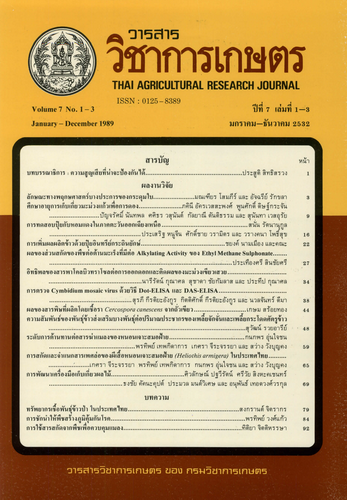การชักนำให้พืชสร้างภูมิคุ้มกันโรค
บทคัดย่อ
การชักนำให้พืชสร้างภูมิคุ้มกันเพื่อต่อต้านการเข้าทำลายของเชื้อโรค สามารถทำได้ในทำนองเดียวกับมนุษย์และสัตว์เมื่อได้รับการกระตุ้นโดยการฉีดวัคซีน ซึ่งจะทำให้ร่างการสร้างภูมิคุ้มกันเกิดขึ้นโดยการสร้างสารแอนติบอดี้ สำหรับพืชก็มีกลไกในการต่อต้านการเข้าทำลายของเชื้อโรคได้เช่นกันเมื่อได้รับการกระตุ้นที่เหมาะสม ซึ่งได้พบว่าหากทำการปลูกเชื้อที่มีความรุนแรงน้อย หรือเชื้อต่างสายพันธุ์หรือเชื้อที่ไม่ใช่สาเหตุโรคของพืชชนิดนั้น จะทำให้พืชมีความต้านทานต่อโรคได้ดีกว่าพืชที่ไม่ได้รับการปลูกเชื้อกระตุ้น นอกจากนี้ ยังอาจใช้สารเคมีบางประเภทที่เป็นองค์ประกอบของผนังเซลล์เชื้อ หรือสารอนินทรีย์บางชนิดกระตุ้นให้พืชต้านทานโรคเพิ่มขึ้น และพืชที่ได้รับการกระตุ้นนี้มักจะมีความต้านทานต่อโรคหลายโรคไม่เฉพาะเจาะจงต่อโรคใดโรคหนึ่งกลไกที่พืชสามารถต้านทานโรคได้ อาจเนื่องมาจากการกระตุ้นการสร้างและสะสมอาหาร phytoalexin ซึ่งเป็นพิษต่อเชื้อโรคต่าง ๆ ขึ้นในตำแหน่งที่เชื้อเข้าทำลาย หรือการสร้างสารชนิดอื่นที่มีฤทธิต่อต้านเชื้อและส่งผ่านไปตลอดลำต้นพืช ทำให้สามารถป้องกันการเข้าทำลายของเชื้อได้อย่างทั่วถึง ในการชักนำให้พืชสร้างภูมิคุ้มกันนี้ แม้จะยังไม่ทราบถึงกระบวนการและหลักการในรายละเอียดอย่างแน่ชัดกับพืชทุกชนิด แต่ถ้าหากทำการศึกษาและปรับปรุงหาเทคโนโลยีที่จะนำเอาความสามารถในตัวพืชนี้มาใช้ได้โดยวิธีการที่ไม่ยากนัก ก็น่าจะเป็นแนวทางเลือกที่ดีอีกประการหนึ่งในการป้องกันกำจัดโรคพืชที่ค่อนข้างปลอดภัยต่อสภาพแวดล้อมเมื่อเปรียบเทียบกับการใช้สารป้องกันกำจัดโรคพืช
ดาวน์โหลด
เผยแพร่แล้ว
รูปแบบการอ้างอิง
ฉบับ
ประเภทบทความ
สัญญาอนุญาต

อนุญาตภายใต้เงื่อนไข Creative Commons Attribution-NonCommercial-NoDerivatives 4.0 International License.
วารสารวิชาการเกษตร



